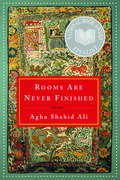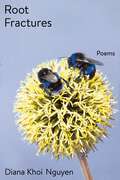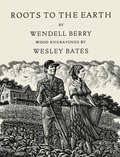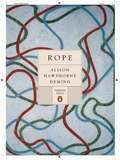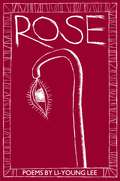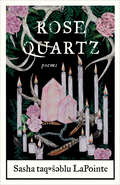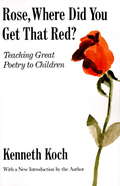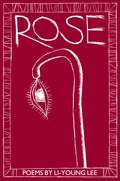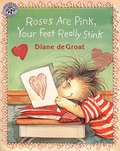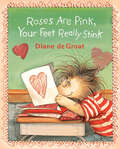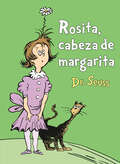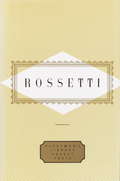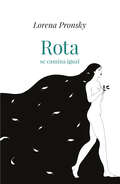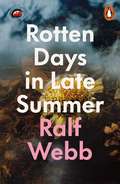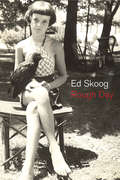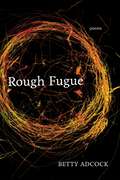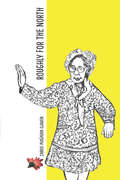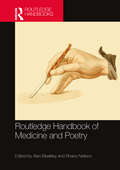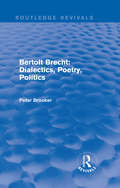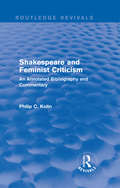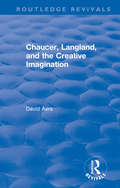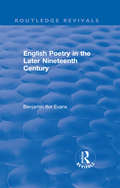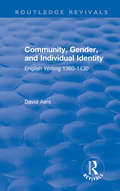- Table View
- List View
Rooms Are Never Finished: Poems
by Agha Shahid Ali"An incomparable work, an unmatched achievement."--Anthony Hecht In this stunningly inventive collection--a finalist for the 2001 National Book Award in poetry--Ali excavates the devastation wrought upon his childhood home, Kashmir, and reveals a more personal devastation: his mother's death and the journey with her body back to Kashmir.
Root Fractures: Poems
by Diana Khoi Nguyen*One of LitHub&’s Poetry Books to Read in 2024* *One of The Millions&’s Must Read Poetry Books of Winter 2024* National Book Award finalist Diana Khoi Nguyen&’s second poetry collection, a haunting of a family&’s past upon its present, and a frank reckoning with how loss and displacement transform mothers and daughters across generations.In Root Fractures, Diana Khoi Nguyen excavates the moments of rupture in a family: a mother who was forced underground after the Fall of Saigon, a father who engineered a new life in California as an immigrant, a brother who cut himself out of every family picture before cutting himself out of their lives entirely. And as new generations of the family come of age, opportunities to begin anew blend with visitations from the past. Through poems of disarming honesty and personal risk, Nguyen examines what takes root after a disaster and how we can make a story out of the broken pieces of our lives. As Terrance Hayes writes, &“&‘There is nothing that is not music&’ for this poet. Poetry is found in the gaps, silences, and ruptures of history.&” This astonishing second collection renders poetry into an act of kintsugi, embellishing what is broken in a family&’s legacy so that it can be seen in a new light.
Roots to the Earth: Poems And A Story
by Wendell Berry Wesley BatesIn 1995, Wendell Berry's Roots to the Earth was published in portfolio form by West Meadow Press. The wood etchings of celebrated artist and wood engraver, Wesley Bates, were printed from the original wood blocks on handmade Japanese paper.In 2014, this work was reprinted along with additional poems. Together with Bates' original wood engravings, and designed by Gray Zeitz, Larkspur Press printed just one hundred copies of this book in a stunning limited edition.Now it is with great pleasure that Counterpoint is reproducing this collaborative work for trade publication, as well as expanding it with the inclusion of a short story, "The Branch Way of Doing," with additional engravings by Bates.In his introduction to the 2014 collection, Bates wrote: "As our society moves toward urbanization, the majority of the population views agriculture from an increasingly detached position... In his poetry [Berry] reveals tenderness and love as well as anger and uncertainty... The wood engravings in this collection are intended to be companion pieces to... the way he expresses what it is to be a farmer."
Rope
by Alison DemingNew from a poet renowned for her lyricism, wisdom, and originalityAlison Hawthorne Deming 's fourth collection of poems follows the paths of imagination into meditations on salt, love, Hurricane Katrina, Greek myth, and the search for extraterrestrial life, all linked by the poet's faith in art as an instrument for creating meaning, beauty, and continuity--virtues diminished by the velocity and violence of our historical moment. The final long poem "The Flight," inspired by the works of A. R. Ammons, is a twenty-first century epic poised on the verge of our discovering life beyond Earth.
Rose
by Li-Young Lee Gerald SternTable of ContentsI.EpistleThe GiftPersimmonsThe Weight Of SweetnessFrom BlossomsDreaming Of HairEarly In The MorningWaterFalling: The CodeNocturneMy IndigoIrisesEating AloneII.Always A RoseIII.Eating TogetherI Ask My Mother To SingAsh, Snow, Or MoonlightThe LifeThe WeepersBraidingRain DiaryMy Sleeping Loved OnesMnemonicBetween SeasonsVisions And Interpretations
Rose (New Poets of America)
by Li-Young LeeTable of ContentsI.EpistleThe GiftPersimmonsThe Weight Of SweetnessFrom BlossomsDreaming Of HairEarly In The MorningWaterFalling: The CodeNocturneMy IndigoIrisesEating AloneII.Always A RoseIII.Eating TogetherI Ask My Mother To SingAsh, Snow, Or MoonlightThe LifeThe WeepersBraidingRain DiaryMy Sleeping Loved OnesMnemonicBetween SeasonsVisions And Interpretations
Rose Quartz: Poems
by Sasha taqwšeblu LaPointeA wild, seductive debut poetry collection by the author of Red Paint evoking pain, healing, and a spellbinding brew of folklore, movies, music, and ritual.“Draw me encircled / in something / other than gasoline.” The poems of Rose Quartz hum with the naked energy of one who has found her way home after a journey rife with difficulty and who has the scars to show for it. In them, Sasha taqwš?blu LaPointe moves from intimate scenes of peril—a car accident, an unwelcome advance at a party, a miscarriage—to the salvific, exhilarating punk scene of the Pacific Northwest and the centering shores of her Coast Salish ancestors. Along the way, she peers into the darker corners of her own search for belonging, and finds there glittering stones dense with meaning and the power to move forward.As game to follow a beckoning Laura Palmer into the burning woods as she is to step into the shoes of Little Red Riding Hood as she lays waste to her wolf, LaPointe explores the sublime space between beauty and danger through lush, almost baroque, use of folktale and color. Red, white, blue, and an amalgam that is none of the above—rose—vie for the speaker’s embrace as a mixed-race woman. Here, poems become offerings, rituals, incantations conjured in the name of healing and power.Like the stones and cards laid on an altar, Rose Quartz offers a reading at the intersection of identity and myth, trauma and truth, telling the story of past, present, and future.“LaPointe conveys with dazzling intensity that while our healing is in our own hands, we need not be alone.” —Minneapolis Star Tribune
Roses Are Pink, Your Feet Really Stink
by Diane DegroatWhen Gilbert writes two not-so-nice valentines to his classmates, his prank quickly turns into pandemonium. But there's always time for a change of heart on Valentine's Day.
Roses Are Pink, Your Feet Really Stink
by Diane deGroatThis Valentine's Day favorite read-aloud will prompt lots of giggles, as well as discussions on kindness and forgiveness.Gilbert is all set to write fifteen friendly valentine cards to his classmates. But how can he write a nice poem for the boy who tweaked his nose, or the girl who made fun of his glasses? Instead, Gilbert writes two not-so-nice valentines...and signs the wrong name on both!When his classmates read his poems, their feelings are hurt, and Gilbert's prank quickly turns into pandemonium. But with the help of a friend and an honest apology, there's always time for a change of heart on Valentine's Day.
Rosita Cabeza de Margarita (Classic Seuss)
by Dr. Seuss¡Edición en rima del fascinante álbum ilustrado de Dr. Seuss acerca de la individualidad y la autoaceptación! De la misma alocada manera en que el Gato causa estragos en El Gato Ensombrerado, una florecita que brota en la cabeza de una niña desata una serie de disparatadas reacciones en este clásico de Dr. Seuss. Ideal para celebrar esas cualidades que nos hacen únicos, ¡este libro de tapa dura es un excelente regalo!Las ediciones rimadas y en español de los clásicos de Dr. Seuss publicadas por Random House brindan la maravillosa oportunidad de disfrutar de sus historias a más de treinta y ocho millones de personas hispanohablantes en Estados Unidos. Los lectores podrán divertirse con las ediciones en español de The Cat in the Hat (El Gato Ensombrerado); Green Eggs and Ham (Huevos verdes con jamón); One Fish Two Fish Red Fish Blue Fish (Un pez, dos peces, pez rojo, pez azul); The Lorax (El Lórax); Oh, the Places You'll Go! (¡Oh, cuán lejos llegarás!); How the Grinch Stole Christmas! (¡Cómo el Grinch robó la Navidad!), y Horton Hears a Who! (¡Horton escucha a Quién!). Ideal tanto para leer en casa como en la escuela, estos libros han sido meticulosamente traducidos, respetando la rima, por autores y traductores latinoamericanos, y supervisados por Teresa Mlawer, reconocida y galardonada traductora durante más de cincuenta años. A rhymed Spanish edition of Dr. Seuss's charming picture book about individuality and self-acceptance!In the same zany way that the Cat wreaks havoc in The Cat in the Hat, a small flower that sprouts from the top of a young girl's head sets off a series of madcap reactions in this classic picture book by Dr. Seuss. An ideal choice for celebrating those qualities that make each of us unique, this unjacketed hardcover makes a great gift!Random House's rhymed Spanish-language editions of classic Dr. Seuss books make the joyful experience of reading Dr. Seuss books available for the more than 38 million people in the United States who speak Spanish. Readers can enjoy over 30 different classic Dr. Seuss titles including The Cat in the Hat (El Gato Ensombrerado); Green Eggs and Ham (Huevos verdes con jamón); One Fish Two Fish Red Fish Blue Fish (Un pez dos peces pez rojo pez azul); The Lorax (El Lórax); Oh, the Places You'll Go! (¡Oh, cuán lejos llegarás!); How the Grinch Stole Christmas! (¡Cómo el Grinch robó la Navidad!); and Horton Hears a Who! (¡Horton escucha a Quién!). Perfect for home and classroom use, they are meticulously translated in rhyme by native Latin American Spanish speakers overseen by award-winning translator Teresa Mlawer.
Rossetti: Poems
by Christina RossettiThese Everyman's Library Pocket Poets hardcover editions are popular for their compact size and reasonable price which do not compromise content. Poems: Rossetti contains a full selection of Rossetti's work, including her lyric poems, dramatic and narrative poems, rhymes and riddles, sonnet sequences, prayers and meditations, and an index of first lines.
Rota se camina igual
by Lorena PronskyLorena Pronsky impuso un nuevo lenguaje en este libro, que lo convirtió clásico entre sus lectores. Rota se camina igual tiene un discurso fiel y contundente que nombra de forma precisa y lacerante las vivencias que todos, en algún momento de nuestra vida, atravesamos. Rota se camina igual es un libro no solo fue un éxito de ventas sino que también se instaló rápidamente como un clásico. Difícil de catalogar dentro de un género literario, Lorena Pronsky logra conmover al lector a través de un lenguaje disruptivo pero sencillo, a través de relatos que nos invitan a conectarnos con nuestras emociones. Apoyada en la herida como parte inevitable de la vida, nos muestra de qué manera podemos darles un nuevo destino a esos dolores que se nos imponen. En este viaje de reencuentro con nosotros mismos nos iremos identificando con las heridas de la pérdida, del abandono, del desamor, y así entender que siempre tendremos dos caminos para elegir: aferrarnos a ese dolor que nos deja en pausa, o bien comprender que asumir la realidad es el primer escalón para reinventarnos e iniciar una nueva etapa. Aceptar que estamos atravesados por tormentas que han dejado una marca indeleble nos enseña que "continuar" es una palabra que encierra todas las posibilidades aún desconocidas. Solo tenemos que tomar ese envión interior para darnos cuenta de que, a pesar de nuestras fisuras personales, rota se camina igual.
Rotten Days in Late Summer
by Ralf WebbA TELEGRAPH AND IRISH TIMES BOOK OF THE YEARLONGLISTED FOR THE POLARI FIRST BOOK PRIZE SHORTLISTED FOR THE FORWARD PRIZE FOR BEST FIRST COLLECTIONSHORTLISTED FOR THE JOHN POLLARD FOUNDATION INTERNATIONAL POETRY PRIZE 'Impressive . . . tender, unflinching' Guardian'This is poetry in the grand tradition of annihiliation by desire. It's what the young are always learning, and the old, if they are wise, never forget' Anne Boyer, author of The Undying'Brilliant . . . heralds the arrival of a frank and vital poetic voice' Sharlene Teo, author of Ponti'Frank and alert . . . an important voice in British poetry' Eley Williams, author of The Liar's Dictionary'Direct and heart-breaking' Alex Dimitrov, author of Love and Other Poems'A rare thing . . . razor-sharp' Julia Copus, author of This Rare Spirit: A Life of Charlotte MewIn Rotten Days in Late Summer, Ralf Webb turns poetry to an examination of the textures of class, youth, adulthood and death in the working communities of the West Country, from mobile home parks, boyish factory workers and saleswomen kept on the road for days at a time, to the yearnings of young love and the complexities of masculinity.Alongside individual poems, three sequences predominate: a series of 'Love Stories', charting a course through the dreams, lies and salt-baked limbs of multiple relationships; 'Diagnostics', which tells the story of the death from cancer of the poet's father; and 'Treetops', a virtuosic long poem weaving together grief and mental health struggles in an attempt to come to terms with the overwhelming data of a life.The world of these poems is close, dangerous, lustrous and difficult: a world in which whole existences are lived in the spin of almost-inescapable fates. In searching for the light within it, this prodigious debut collection announces the arrival of a major new voice in British poetry.
Rouge Memoire: Poesie
by Huguette BertrandENTRE NOUS<P> C'est entre vous et moi que ça se passe<P> entre nos apparences<P> qui ont l'air de dire que nous ne sommes pas là<P> corps défaits par l'haleine chaude de la nuit<P> et les jeux bêtes<P> dormeurs éveillés par un baiser de cheval<P> le hasard prend forme<P> Les jeunes lampes<P> sont des fontaines domptéees<P> par les yeux qui passent
Rough Day
by Ed SkoogComposed during long walks throughout Washington, DC, and careful to err on the side of recklessness, Rough Day finds its essential unity in a fixation on American events and landscapes-from Yellowstone and New Orleans to Kansas and the Pacific Northwest. Throughout, Ed Skoog maintains an openness to discovery that unveils rare and prismatic views into his country.A native of Topeka, Kansas, Ed Skoog's first book of poetry, Mister Skylight (Copper Canyon Press), was published in 2009. His poetry has appeared in Poetry, American Poetry Review, and The Paris Review. He teaches at the University of Montana and lives in Missoula, Montana
Rough Fugue: Poems (Southern Messenger Poets)
by Betty AdcockBetty Adcock brings fierce insight to her seventh poetry collection, Rough Fugue. Her elegant stanzas evoke bygone moments of beauty, reflection, and rage. “Let things be spare,” she writes, “and words for things be thin / as the slice of moon / the loon’s cry snips.” Adcock’s poems are often spare but never thin, shifting effortlessly from the eerie red of brake lights on a Texas highway to the fluorescents of an office building where a tired worker imagines a holiday in Spain.Adcock reflects upon her poetic forebears, chronicling the desire to write that led them to create cuneiform tablets, scrolls of papyrus, and ultimately vellum and parchment. She also recounts memories about the life with her late husband and tries to define herself in the bewildering new role of “widow.” In poems ranging in tone from playful to reverential, Rough Fugue showcases the work of a veteran poet at her masterful best.
Roughly For the North (The Alaska Literary Series)
by Carrie Ayagaduk Ojanen“I wish I were a dancer to let lines fall like that. / But I am dressed like you, roughly for the North.” Roughly for the North is a tender and complex portrait of an Arctic and sub-arctic world. Full of lush language and imagery, each poem is an act of devotion and love to one’s family and land. Carrie Ayaġaduk Ojanen weaves a moving portrait of grief, of the rippling effects of historical trauma on succeeding generations, of resilience in the face of adversity, of respect for the Alaska Native traditions she grew up in. With vivid imagery, she draws the reader into Northern life, where the spiritual and industrial collide. She uses formalism and lyrical free verse to explore the natural world and to conjure a place of staggering beauty that hides death around every corner. A member of the Ugiuvamiut tribe, Ojanen grounds her work in a web of familial relationships. Especially important is her connection with her grandparents, members of the last generation to make their home on Ugiuvak (King Island), Alaska. With heartfelt verse, her poems reflect the staggering cultural changes her grandparents faced and the way traditional art forms continue to unite her community and help them connect to the past.
Routledge Handbook of Medicine and Poetry
by Shane Neilson Alan BleakleyThe Routledge Handbook of Medicine and Poetry draws on an international selection of authors to ask what the cultures of poetry and medicine may gain from reciprocal critical engagement. The volume celebrates interdisciplinary inquiry, critique, and creative expansion with an emphasis upon amplifying provocative and marginalized voices.This carefully curated collection offers both historical context and future thinking from clinicians, poets, artists, humanities scholars, social scientists, and bio-scientists who collectively inquire into the nature of relationships between medicine and poetry. Importantly, these can be both productive and unproductive. How, for example, do poet-doctors reconcile the outwardly antithetical approaches of bio-scientific medicine and poetry in their daily work, where typically the former draws on technical language and associated thinking and the latter on metaphors? How does non-narrative lyrical poetry engage with narrative-based medicine? How do poets writing about medicine identify as patients? Central to the volume is the critical investigation of the consequences of varieties of medical pedagogy for clinical practice.Presenting a vision of how poetic thinking might form a medical ontology this thought-provoking book affords an essential resource for scholars and practitioners from across medicine, health and social care, medical education, the medical and health humanities, and literary studies.
Routledge Revivals (1988): Dialectics, Poetry, Politics
by Peter BrookerFirst published in 1988, this books argues with received accounts to reclaim Brecht’s emphasis on his self-described ‘dialectical theatre’, re-examining firstly the concepts of Gestus and Verfremdung and their realisation in Brecht’s poetry in terms of his attempt to consciously apply the methods of dialectical materialism to art and cultural practice. The author also takes issue with the customary view of Brecht’s career and politics which sees him as compromising either with Communist party dogma or bourgeois aesthetics, to find developing parallels between Brecht’s political and artistic though and the critical dialectics of Marx, Lenin and Mao. This development is examined in later chapters in relation to the early and late plays, The Measures Taken and Days of the Commune as well as in relation to Brecht’s changed circumstances in the years of war-time exile and in post-war East Germany.
Routledge Revivals: An Annotated Bibliography and Commentary (Routledge Revivals)
by Philip C KolinFirst published in 1991, this book is the first annotated bibliography of feminist Shakespeare criticism from 1975 to 1988 — a period that saw a remarkable amount of ground-breaking work. While the primary focus is on feminist studies of Shakespeare, it also includes wide-ranging works on language, desire, role-playing, theatre conventions, marriage, and Elizabethan and Jacobean culture — shedding light on Shakespeare’s views on and representation of women, sex and gender. Accompanying the 439 entries are extensive, informative annotations that strive to maintain the original author’s perspective, supplying a careful and thorough account of the main points of an article.
Routledge Revivals: Chaucer, Langland, and the Creative Imagination (Routledge Revivals)
by David AersFirst published in 1980, this study of two renowned later fourteenth century English poets, Chaucer and Langland, concentrates on some major and representative aspects of their work. Aers shows that, in contrast to the mass conventional writing of the period, which was happy to accept and propagate traditional ideologies, Chaucer and Langland were preoccupied with actual conflicts, strains, and developments in received ideologies and social practices. He demonstrates that they were genuinely exploratory, and created work which actively questioned dominant ideologies, even those which they themselves revered and hoped to affirm. For Chaucer and Langland the imagination was indeed creative, involved in the active construction of meanings, and in their poetry they grasped and explored social commitments, religious developments and many perplexing contradictions which were subverting inherited paradigms.
Routledge Revivals: English Poetry in the Later Nineteenth Century (Routledge Revivals)
by B. Ifor EvansFirst published in 1933, this study, which underwent revision in the 1960s, is a comprehensive survey of the verse of English nineteenth-century poets whose work appeared after 1860. A special feature is the full and critical treatment of minor writers. In no other book is their work so carefully evaluated. There is a full account of the minor Pre-Raphaelites, of James Thomson, the poet of The City of Dreadful Night, of Henley, Stevenson and George MacDonald. John Davidson is the subject of a long and revealing study. Evans suggests that poetry from the late nineteenth century is neglected in scholarly study, and that Victorian Romanticism deserves more attention than it has recently received.
Routledge Revivals: English Writing 1360-1430 (Routledge Revivals)
by David AersFirst published in 1988, David Aers explores the treatment of community, gender, and individual identity in English writing between 1360 and 1430, focusing on Margery Kempe, Langland, Chaucer, and the poet of Sir Gawain. He shows how these texts deal with questions about gender, the making of individual identity, and competing versions of community in ways which still speak powerfully in contemporary analysis of gender formation, sexuality, and love. Making wide use of recent research on the English economy and communities, and informed by current debates in the theory of culture and gender, the book will be of interest to those concerned with Medieval studies, Renaissance studies, and Women’s studies.
